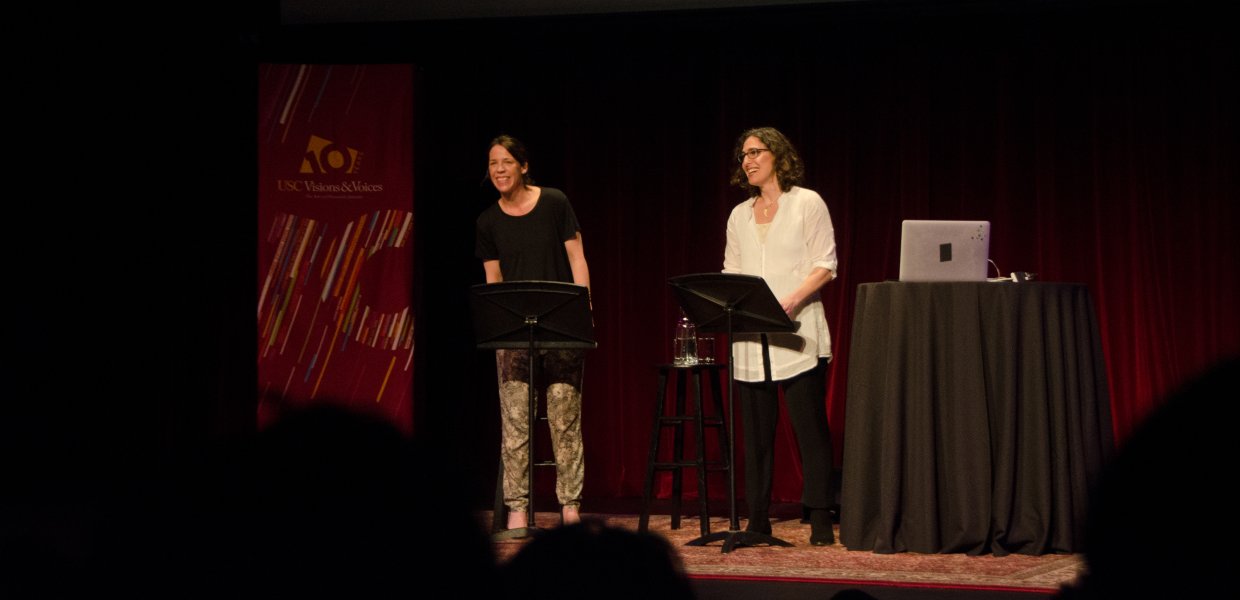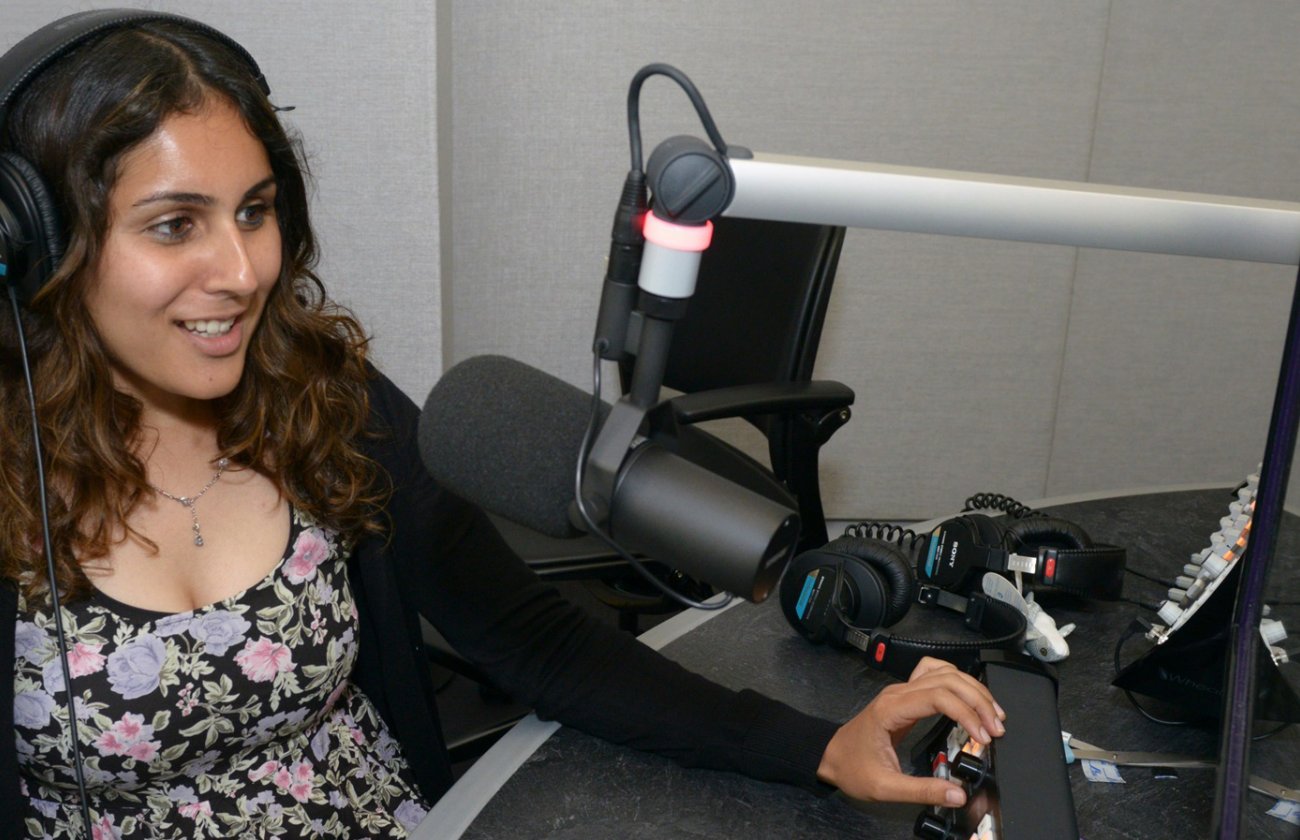Many religiously followed along each week listening to Sarah Koenig’s measured voice as she investigated a murder case in Baltimore that combined high school drama, dating and immigrant families.
This journalistic endeavor is, of course, the podcast “Serial.” And on Friday, March 4, USC Visions and Voices: The Arts and Humanities Initiative presented “Binge-Worthy Journalism: Backstage with the Creators of Serial, Sarah Koenig and Julie Snyder” to a packed Bovard Auditorium.
The first season of “Serial,” hosted by “This American Life’s” Koenig, began in 2014. The podcast retraces the murder of Hae Min Lee and the ex-boyfriend accused of her murder, Adnan Syed. Syed is serving a life sentence for the murder but just this year was back in court to determine if he could get a new trial.
“Serial,” is now in its second season and follows the story of Bowe Bergdahl, the U.S. soldier who walked off his post in Afghanistan in 2009 and was captured and held by the Taliban.
The idea for Season 1 of “Serial” came from reporting Koenig had already done on the Adnan Syed case.
“We had the story sitting right in front of us,” Koenig said. “I loved the world of it — high school, immigrant families.”
Snyder and Koenig started recording “Serial” in the basement of Koenig’s house. But, Snyder recalled, they had to pause recording anytime Koenig’s kids flushed the toilet upstairs, drawing laughter from the crowd.
Narrative storytelling wasn’t new, but the podcast took off. “Serial” started to break records, with more than 175 million downloads between Season 1 and Season 2, Snyder said.
Both told the audience how the idea of “Serial” was born. The initial idea was a news show similar to “This American Life,” but covering big news stories, Koenig said. They pitched the idea called “This Week” to the staff during an overnight retreat in upstate New York. The reaction wasn’t positive.
Then, Ira Glass asked them if they had any other ideas and Snyder recalled suggesting a serialized story — a story that the public could come to, week after week. Glass loved the idea.
“Within the week, we were working on “Serial,” Snyder said. “I realized a good idea can be easy, it can speak for itself.”
During the first season of “Serial,” Koenig said it was hard to get sources to talk about the case. Detectives didn’t want to talk to her nor did Jay, the state’s main witness, and a key character in the case.
Koenig worked around that with the public documents law enforcement gave to the team, which, she said included the most random information like photos of tires, a page from a phone book or a plain envelope.
“Serial” is the only podcast to be the recipient of the Peabody Award in 2014.The podcast was the topic of conversation in coffee shop lines, first dates and everything in between: “Do you think Adnan did it?” “What was up with Jay?”
The first season also brought out a lot of public audience engagement, with podcasts made about “Serial,” spoofs on Saturday Night Live, countless news stories all over the world and reaction from Reddit, the online community where users can submit content, news and share links.
For Koenig, the relationship she had with Adnan Syed was central to the podcast. She said she roughly had 42 hours of phone calls with him.
“In 42 hours, it’s not all criminal related, we’ll just talk,” Koenig said as she replayed “Serial” audio from her exchange with Syed.
Daria Yudacufski, executive director of USC Visions and Voices, said Koenig and Snyder are taking news stories and transforming them into truly human experiences through “Serial.”
“In the stories that they’ve have chosen so far, I think they are really giving voice to people who would otherwise be silenced,” she said. “It’s voices we would never get to hear from and they’re complex.”
Yudacufski said she wanted USC students know there are opportunities for them to make media in way that is meaningful and there are new and innovative ways of doing things.
Diana Kruzman, a USC Annenberg first year print journalism and Middle Eastern Studies major, said she liked how Koenig and Snyder structured the event as a presentation.
“For me, it's not necessarily the medium (a podcast) that attracted people, but the narrative structure that drew listeners into the story and made them hungry for more,” Kruzman said in an email. “Good journalism does that, and I think “Serial” showed people what good journalism can do.”
Her friend, James Tyner, a USC Annenberg first year print journalism major, said “Serial” brought journalism to the public in a way they weren’t used to before.
“When people are exposed to “Serial,” they see it for what it is — it’s something that’s more accepting,” Tyner said. “The noble aspects of journalism have come to the public eye.”
“Serial” changed the way the public thinks about podcasts — and journalism. Snyder said one of the things that “Serial” has taught everyone is we, as a society, are not morons.
“We do have patience for journalism that takes its time,” Snyder said. “It’s been heartening, so thank you.”




